In theory, eating eggs might seem like a lovely thing. Chickens that roam free, peck in the dirt, eat natural foods, and fertilize the soil sound like an adorable part of a sustainable food system. And since hens lay eggs regularly, collecting them may seem like a harmless practice — certainly when compared to meat consumption.
But that vision of bucolic, happy chickens doing their thing and sharing their eggs with caring farmers is far from the norm. Most eggs today come from factory farms, where conditions raise serious health, ethical, and environmental concerns.
Beyond these long-standing concerns, rising egg prices, shortages, and the impact of bird flu outbreaks have contributed to questions about eating eggs, leaving many wondering: Are eggs worth the cost? And are they healthy for people, animals, or the planet?
This article explores the nutritional benefits and risks of eggs, their safety in light of disease outbreaks, and the ethical and environmental impact of egg production.
How Are Eggs Produced?
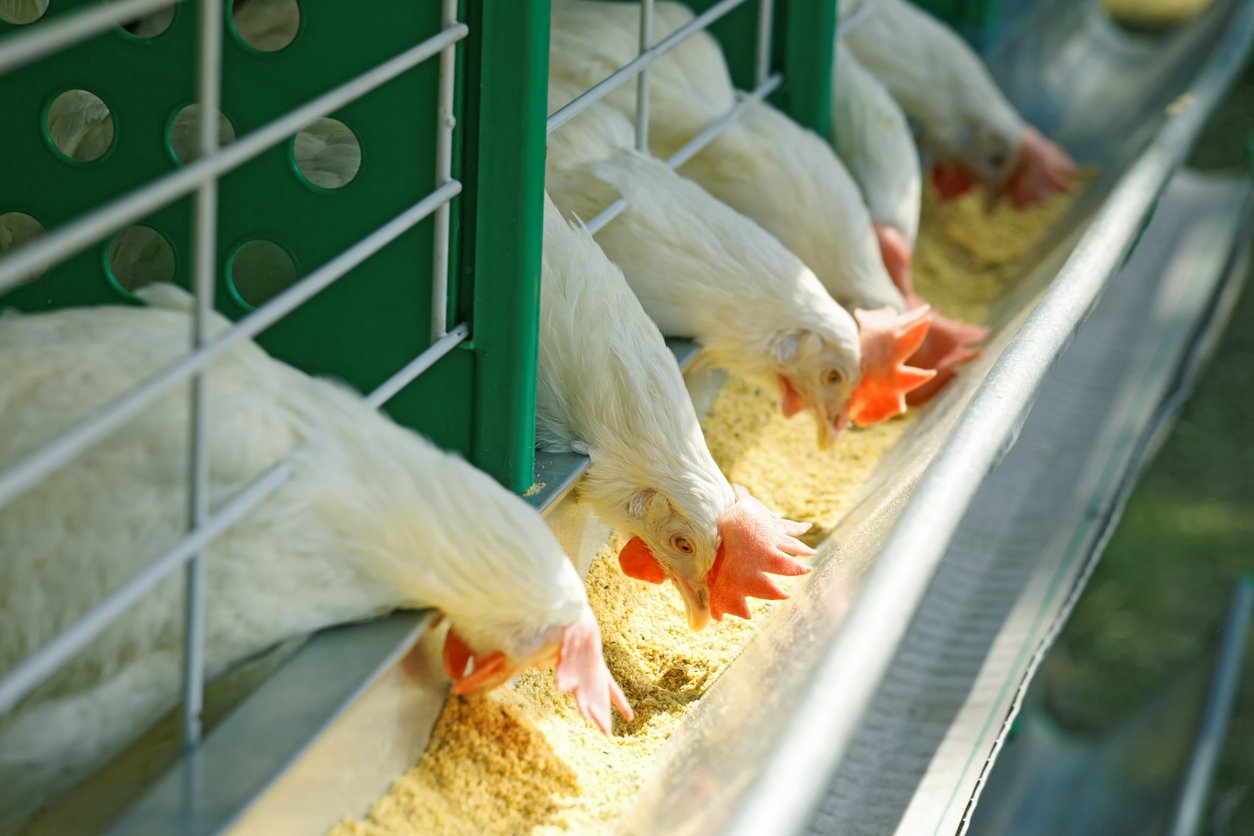
Most eggs sold in stores today come from factory farms, where hens live in overcrowded conditions that increase disease transmission, including salmonella and bird flu. More than 2/3 of the eggs produced commercially in the US come from caged hens. The average caged laying hen spends her entire life in an area smaller than a single sheet of paper — and may be unable to lift a single wing or to move more than a step or two.
The cages are typically stacked so that the feces and urine of the upper birds constantly fall on the heads of the ones below. To prevent hens from pecking and wounding each other in these conditions, part of their beaks are cut off with a hot blade.
Chickens often die in their cages and are sometimes not even removed when they do. The birds who survive only live to be around two years old (about a quarter of their natural lifespan), and then they are killed due to their waning egg production.
This means that one hen is killed for about every 600 eggs. Because roosters do not lay eggs, the hatcheries kill all the male chicks immediately. Often, they are disposed of in horrific ways — including being ground up alive.
When there are disease outbreaks, like the recent H5N1 influenza or avian flu, millions of birds and other livestock are killed proactively to limit the spread of disease. In response to the 2025 bird flu epidemic, over 158 million chickens and turkeys have been killed as of this writing, and the number continues to rise every week.
Eggs and Environmental Sustainability
The average US resident eats about 284 eggs per year, which is 96 billion eggs per year in the US alone (not including Halloween mischief and Easter crafts).
It takes about 382 million egg-laying chickens to produce all those eggs — each producing an average of over 250 eggs per year. By the way, those are different birds than the over nine billion broiler hens — chickens raised for meat — that are killed every year.
And while a few chickens running around can be beneficial as part of a backyard farm or suburban homestead, when concentrated in huge numbers in industrialized operations, the results are quite different — and disturbing.
With a small flock of chickens, they might eat weeds, bugs, and kitchen scraps. And their waste can return fertility to the soil. In a way, it’s like speeding up the composting process that would occur if you just took what chickens eat and waited for it to break down naturally.
By contrast, the massive amount of chicken manure produced in factory farms that house up to 20,000 chickens in a warehouse is a problem with no good solution.
The chicken manure often winds up as runoff into streams, lakes, and other bodies of water. All these compounds in water lead to algae blooms, often resulting in massive fish kills. Pathogenic microbes in chicken waste also cause disease in land animals.
Workers in chicken warehouses who inhale the dust of chicken poop are at risk for a serious lung infection called histoplasmosis. Their contact with chickens also puts them at risk for salmonella and campylobacter — the same bacterial diseases that consumers of chickens and eggs may contract.
In backyard farms, chickens might eat compost and a few snails or slugs. However, in industrial operations, their diet is based on grains and legumes.
Any time you move up the food chain by feeding livestock, you get waste. It takes about four pounds of chicken feed and 636 gallons of water to produce a dozen eggs.
In a resource-depleted world, it’s almost always more efficient to eat food directly than to cycle it through animals.
Are Eggs Safe To Eat?
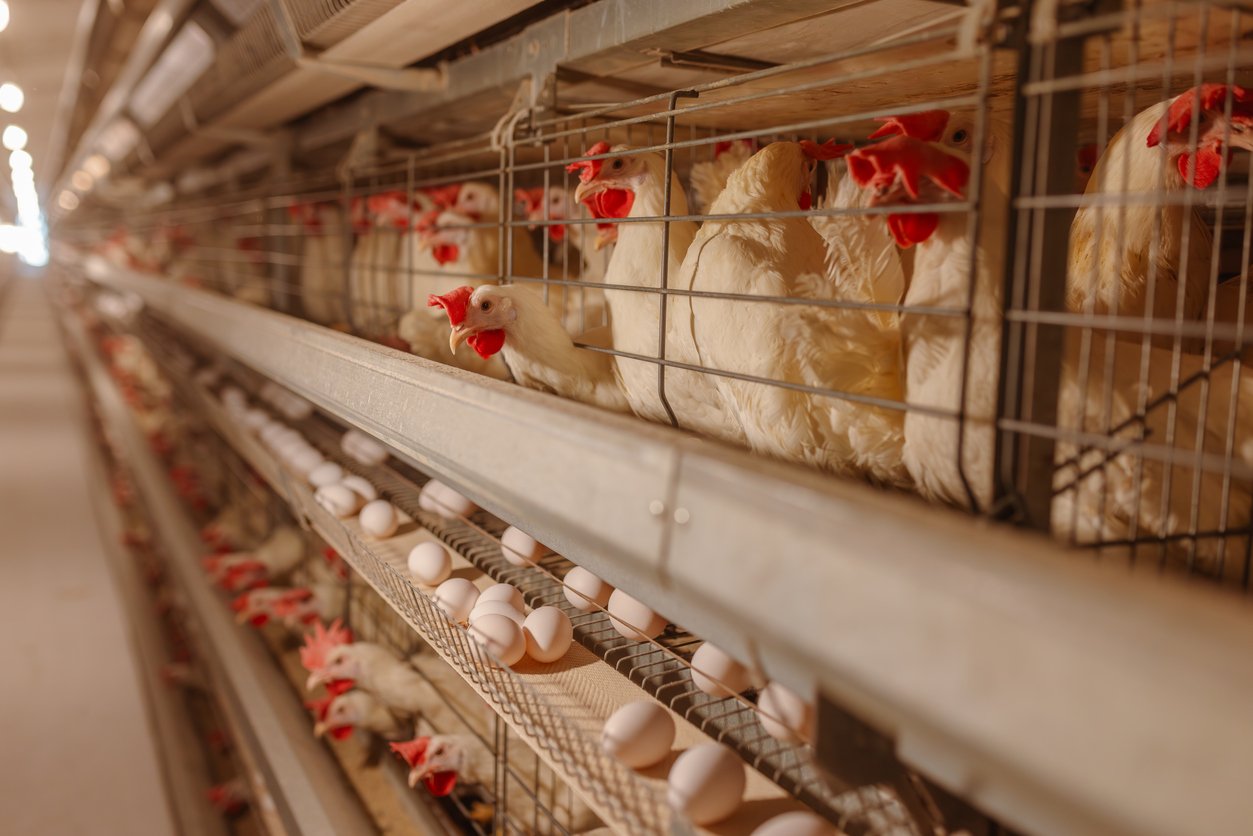
You might think that eggs are safe to eat because they’re enclosed in those shells that keep the outside world out. But alas, that’s often not the cause. Eggs can spread foodborne illnesses. More and more, things like bird flu outbreaks and unhygienic conditions in factory farms increase the risk of dangerous pathogens spreading to humans.
One of the most common egg-borne contaminants is Salmonella enteritidis, a bacterium that causes food poisoning. Eggs can become contaminated with salmonella in two ways: externally, when bacteria from chicken feces come into contact with the eggshell, or internally, if a hen is infected and passes the bacteria into the egg before the shell forms.
Symptoms of salmonella infection include nausea, diarrhea, and fever, and can be severe for vulnerable individuals, such as children or the elderly.
Because of the risk of harmful bacteria exposure and their perishable nature, the USDA classifies eggs as hazardous food requiring proper storage and cooking.
To reduce potential health risks when eating eggs:
- Refrigerate eggs at or below 40 F (4 C)
- Cook eggs until yolks and whites are firm (160 F or 71 C)
- Avoid raw eggs
What About Bird Flu?
Bird flu, also known as avian influenza, can affect humans as well as birds. In fact, bird flu has already infected many dozens of people, leading many scientists to fear that it could lead to human-to human transmission and could even turn into a pandemic.
Symptoms in humans range in severity from mild to life-threatening. In some cases, it can progress to severe illness, including pneumonia, acute respiratory distress syndrome and multiple organ failure. Considered to be “highly pathogenic,” bird flu is now spreading to more and more mammals, including some, like dairy cows, sheep and pigs, that interact closely with people, increasing the threat of transmission to humans.
Drinking raw (unpasteurized) milk may be particularly dangerous. The bird flu virus has been found in raw milk samples from infected dairy cattle, with some samples containing high levels of the virus. Accordingly, the CDC and other health agencies advise against consuming raw milk.
According to the CDC, however, you can’t get bird flu from eating eggs. Most often, people who become sick with bird flu have had close contact with infected animals. People can become infected by touching infected birds, their droppings, or bedding, or by handling sick or dead animals.
Bird flu infections have led to mass culling of hens, causing egg shortages and price hikes. This impacts the price and availability of eggs, but not so much their safety to humans.
Are Cage-Free, Free-Range, or Organic Eggs Better?
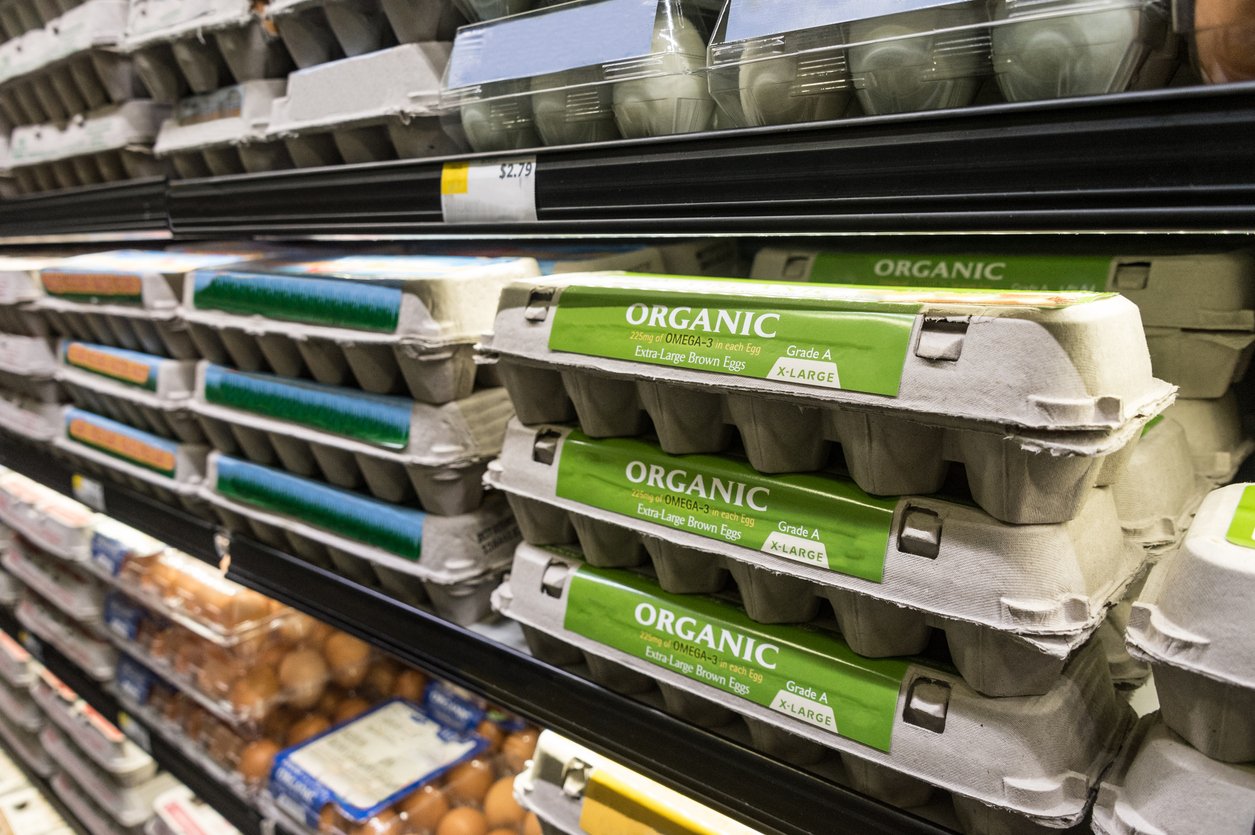
If, for ethical reasons, you don’t want to support factory farms, can you be reassured your eggs are safe and ethical with the “cage-free,” “free-range,” and “organic” labels?
The short answer is no. These egg labels aren’t all they’re cracked up to be. (Sorry, my punny self just came out of its shell.)
Organic eggs come from hens who are not given antibiotics and are fed organically-grown feed free of GMOs and synthetic pesticides. But an organic certification tells you almost nothing about the actual conditions in which the birds live.
The “cage-free” and “free-range” labels mean birds are given at least a bit more space. But that doesn’t mean they were tucked in at night by farmers who read them bedtime stories.
Cage-free birds are typically given 1.5 square feet of space per bird, but the FDA doesn’t have clear rules.
Certified Humane free-range birds get at least two square feet and must technically have access to the outdoors. But in practice, this often means they have a door to a tiny outdoor patch of dirt — and still spend their entire lives cooped up in a giant barn with thousands of other birds.
Excretory ammonia typically chokes the air in cage-free, free-range, and organic operations, affecting the health of birds and humans.
In short, “cage-free,” “free-range,” and “organic” birds can still be confined with little or no access to the outdoors. They can still be debeaked. They can still breathe in air heavy with their excrement. And they can still live in such cramped conditions that they cannot spread their wings.
Can Ethical Eaters Trust Any Egg Labels?
So, are there any egg labels that an ethically-minded consumer can trust?
Perhaps. The label “pasture-raised” is meant to ensure that birds get at least 108 square feet per bird, though it isn’t necessarily monitored.
If the pasture-raised label is combined with the USDA Organic and Certified Humane labels or the Animal Welfare Approved label, you likely have a product from chickens who ran around, saw the sun, spread their wings, scratched in the dirt, and ate bugs.
Of course, organic and pasture-raised eggs can be pricey — sometimes reaching $10 or $12 per dozen. But at least the chickens were treated decently.
If you want to eat eggs, the best option may be eggs without a label, such as those from a farmers market, backyard chickens, or small-scale farms. This way, you’ll know you aren’t contributing to the tremendous cruelty and the environmental disaster from conventionally produced egg operations.
Are Eggs Healthy for Humans?

Ethical and sustainability considerations aside, from a health perspective, what’s the skinny on eggs?
Before we look at the research, let’s put one thing in perspective. It likely matters how an egg is produced and what its mother was fed. When chickens are pasture-raised, their eggs contain less saturated fat, and more vitamin A, omega-3s, and vitamin E than industrially-farmed eggs.
Do those improvements matter? Because almost all the eggs produced and consumed today come from animal factories, studies that have assessed the health impact of eating eggs were done on people who mostly ate eggs from factory farms. So, we don’t really know the effects of pasture-raised eggs on human health.
Egg Nutrition
Whether raised in a pasture or cages, chicken eggs are potential chicken embryos (depending on if they’re fertilized and allowed to develop). But they’re more than that because eggs also contain all the nutrients that the little possible bird-to-be (the yolk) would need to grow into a tiny chick.
Along with 187 mg of dietary cholesterol (a hotly debated substance that may not be as bad for you as was previously believed) and 1.6 grams of saturated fat, a typical hard-boiled egg contains a decent amount of folate, riboflavin, selenium, choline, vitamin B12, and fat-soluble vitamins A, D, E, and K, as well as lecithin. A hard-boiled egg also provides around 6 grams of protein.
But almost all the vitamins and minerals in eggs can be obtained in plant foods — with a lot more fiber (eggs contain none) and without saturated fat. (The one exception to this is vitamin B12 — learn more about how to get enough B12 on a plant-based diet, here.)
Eggs and Eye Health

Eggs yolks are also touted as sources of the carotenoids lutein and zeaxanthin. These antioxidants find a home in the eye’s retina and protect the eye from harmful ultraviolet rays in sunlight and age-related conditions, such as macular degeneration and cataracts.
One study showed increased blood levels of lutein by up to 50% and zeaxanthin by up to 142% when participants ate 1.3 egg yolks per day.
However, eggs aren’t the only sources of lutein or zeaxanthin.
Lutein and zeaxanthin are both found abundantly in a number of plant foods: squashes, peas, dark leafy greens, yellow corn, pumpkin, asparagus, carrots, broccoli, kiwi, grapes, and many more.
Also, chickens aren’t magical beings that synthesize these compounds out of thin air. There is lutein and zeaxanthin in eggs because chickens eat plants containing those compounds.
Eggs and Protein
Eggs contain a significant amount of protein, an important nutrient for growth, maintenance, repair, and overall health. But before you get too egg-cited (sorry, was that one egg j-yolk too many), research provides growing evidence that animal protein is inferior to plant protein and potentially carcinogenic.
Legumes (and other foods) are rich in protein without the drawbacks of animal protein, such as increased levels of cancer-promoting insulin-like growth factor 1 (IGF-1) in the bloodstream.
And many of us may be getting too much protein for optimal health. Excess protein consumption has been linked to a number of health conditions, including cardiovascular disease, kidney disorders, cancer, and premature death.
Egg proteins also cause common and sometimes severe egg allergies: the immune system reacts to those proteins and releases histamine, triggering allergic symptoms in some people.
Does the USDA Say Eggs are Healthy?
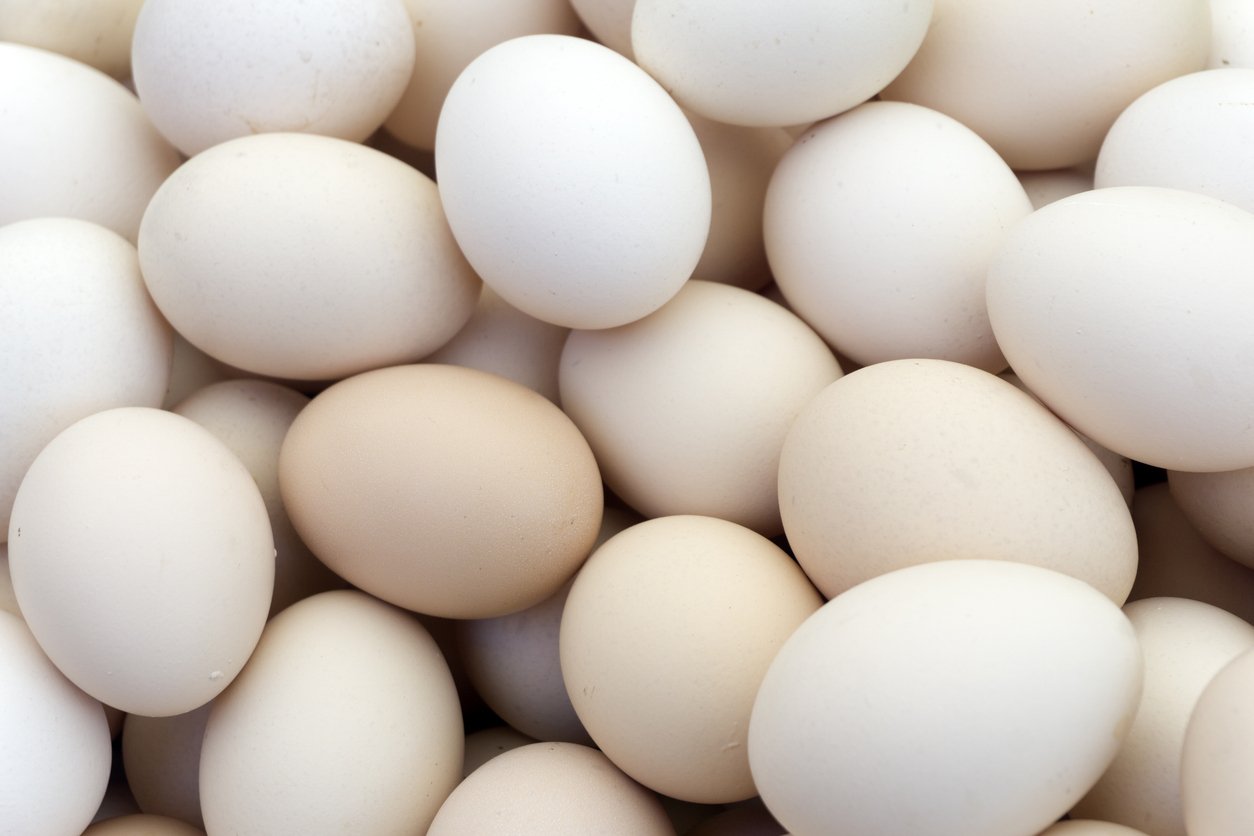
Interestingly, the American Egg Board, a promotional entity funded by egg producers and administered by the USDA, spends about $20 million every year promoting egg consumption.
And yet, the USDA insists that any ads supported by the Egg Board conform to government regulations, which forbid false advertising.
In 2014, Michael Greger, MD, used a Freedom of Information Act request to uncover that the USDA had specifically prohibited the Egg Board from describing eggs as “healthy,” “nutritious,” or “helpful with weight loss.” The board wasn’t even allowed to say they “contribute nutritionally” or “contribute healthful components.”
Why? Because, according to the USDA, those statements would have been lies. What the USDA finally allowed the Egg Board to say, after much negotiation, was that eggs “reduce hunger.”
I don’t know about you, but I don’t find that an especially compelling health claim. I hope that food reduces hunger! And apparently, it’s about all that the Egg Board could come up with at the time that met with USDA approval.
(Actually, that’s not entirely true. If you’re of a certain age, you may remember the catchy jingle used in Egg Board advertising from the mid-1970s through the early 1990s: “The incredible, edible egg.” And it’s true — eggs are edible. Though that’s not exactly a ringing endorsement either!)
Update: On December 19, 2024, the FDA changed its definition of “healthy” to include eggs, while also acknowledging that the National Academies continue to recommend that “dietary cholesterol consumption be as low as possible.”
Egg Health Risks
In March 2019, researchers from four universities published the results of a massive study in the JAMA medical journal.
The researchers followed 29,615 US adults for an average of 17.5 years. They found that those participants who ate an average of 2 eggs per day had a 27% increased risk of developing heart disease.
Renowned cardiologist Dr. Joel Kahn, a Food Revolution Summit speaker, points to multiple studies linking egg consumption not only to increased risk of coronary heart disease, congestive heart failure, and carotid artery disease — but also prostate cancer, breast cancer, ovarian cancer, colon cancer, and last but not least, death.
And what about diabetes? Some health advocates point out that eggs contain no carbs and recommend them for people concerned about diabetes to help balance blood sugar. But that advice may be ill-founded.
The Physicians’ Health Study tracked 21,327 participants over 20 years. It found that amongst those who have diabetes, those who ate the most eggs were twice as likely to die during the study, compared to those who ate the least.
Why Are Egg Prices So High?

In addition to health, ethical, and sustainability issues, another major factor driving the increased scrutiny of eggs is their rising cost.
In recent years, egg prices have surged due to supply chain disruptions, increased feed costs, and the devastating impact of avian influenza. With millions of hens culled to contain outbreaks, supply has struggled to keep up with demand, leading to shortages and higher prices at grocery stores.
For many consumers, these factors have prompted a reevaluation of eggs — not just from a health or ethical standpoint but also from an economic one. In the US, the average cost of a carton of eggs hit a peak of $6.23 in March of 2025, and in some places, eggs cost $10 or more per dozen. For folks on a budget, eggs look more and more like a luxury food item than a necessity.
As we’ve seen, of course, there’s nothing luxurious about how chickens are treated to produce most of those eggs in the first place.
Ways To Go Egg-Free
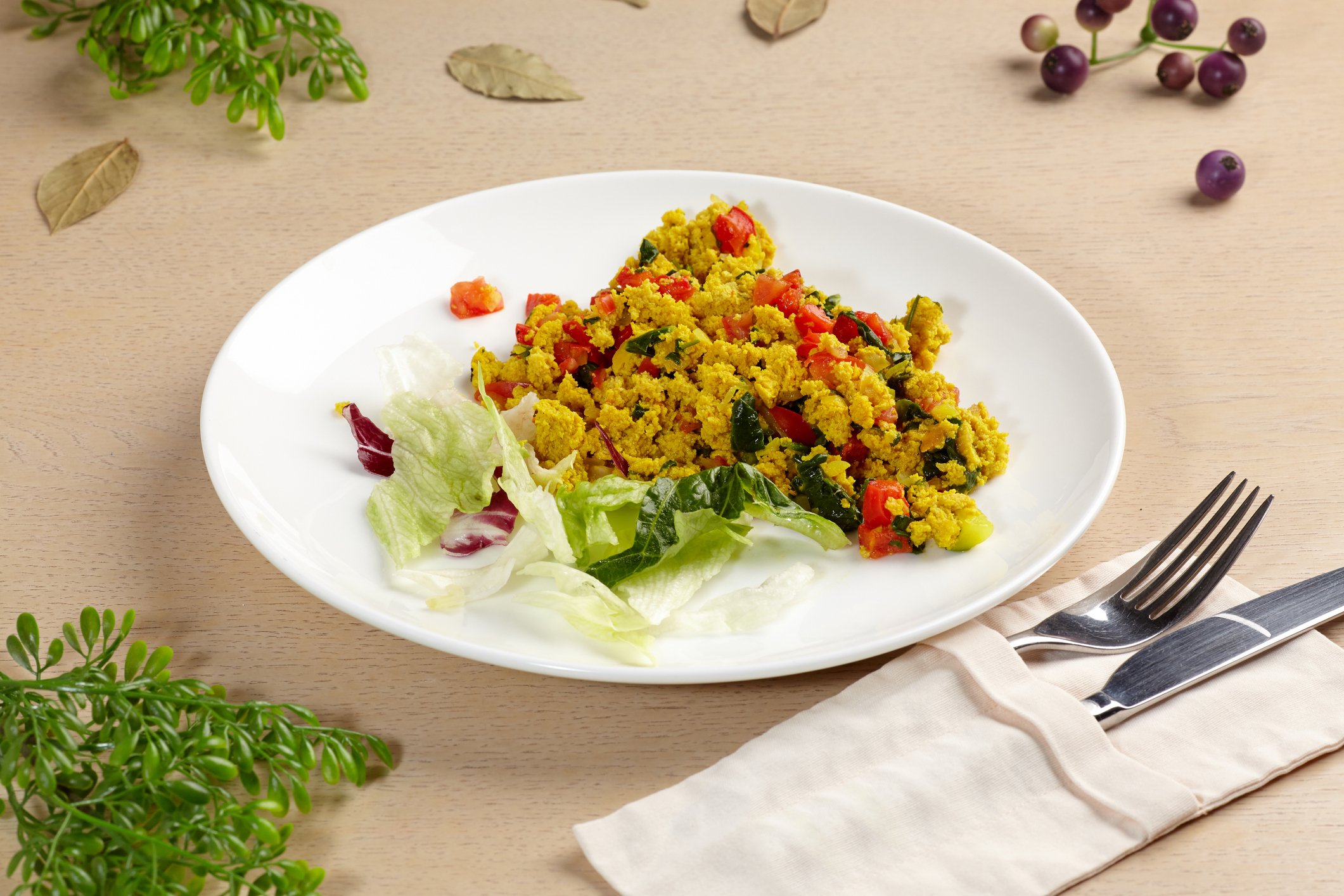
If you’re concerned about the health risks, ethical concerns, environmental impacts, or economic considerations of industrialized egg production, you might wonder if there are better alternatives.
The good news is, there are. Here are a couple of tips that might help:
1. Try a liquid egg replacer.
If you’re looking for an easy way to recreate scrambled eggs (and you don’t mind incorporating some refined foods), Eat Just offers a plant-based liquid egg replacer. Made from mung bean protein, those who have tried it say it’s hard to tell the difference between scrambled Just Eggs and scrambled chicken eggs. Ener-G also makes a powdered egg replacer that can be useful in baking.
2. Make plant-based versions of traditional egg dishes.
The following ingredients can make good substitutes for cooked egg-based dishes:
- Organic tofu: Great for scrambles, “egg” salad, quiches, and frittatas.
- Chickpea flour: Also called besan, is a flour made from, you guessed it, ground chickpeas. While it’s popular in Indian cuisine, you can also use it to create soy-free scrambles and frittatas.
- Potatoes: Boiled red potatoes can make a worthy plant-based vessel for deviled “eggs.”
3. Use vegan egg alternatives in your baked goods.
Eggs are frequently used in many baked goods, but many vegan substitutions are healthier and cruelty-free.
- Flax or chia egg: To make this vegan binder, mix one tablespoon of ground flaxseeds or chia seeds with three tablespoons of water. Then let it thicken for 15–30 minutes before mixing with other baking ingredients.
- Applesauce: In baked goods, you can use a quarter cup of applesauce in place of each egg.
- Aquafaba: Also known as chickpea water, aquafaba is the liquid found in canned chickpeas or garbanzo beans. To use aquafaba as an egg replacement, you’ll need about three tablespoons. Aquafaba can also create vegan meringues to replace egg whites.
For a collection of egg-free dessert recipes, check out our article Baking Without Eggs: 7 Easy Eggless Desserts Perfect for Any Occasion.
To Egg Or Not To Egg
Eggs have long been a staple in many diets, but their health impacts, ethics, and sustainability are more complex than they seem. While eggs can offer protein and essential nutrients, they also come with additional concerns, including salmonella risks, factory farming conditions, environmental impacts, and links to chronic disease. Recent bird flu outbreaks, rising egg prices, and supply chain disruptions have only added to the debate.
If you eat eggs, opting for pasture-raised or locally sourced “backyard garden” eggs may offer a more ethical and sustainable option. However, if you want to reduce or eliminate eggs from your diet, plant-based alternatives can provide similar texture and functionality in cooking and baking.
Ultimately, the decision comes down to your values, health goals, and priorities. Now that you have the facts, how will eggs fit onto your plate? Or will you opt for egg-cellent alternatives?
Tell us in the comments below:
- What do you think? Are eggs healthy?
- Do you eat eggs? Why or why not?
- What are your favorite egg alternatives?
Featured Image: iStock.com/Sanny11



